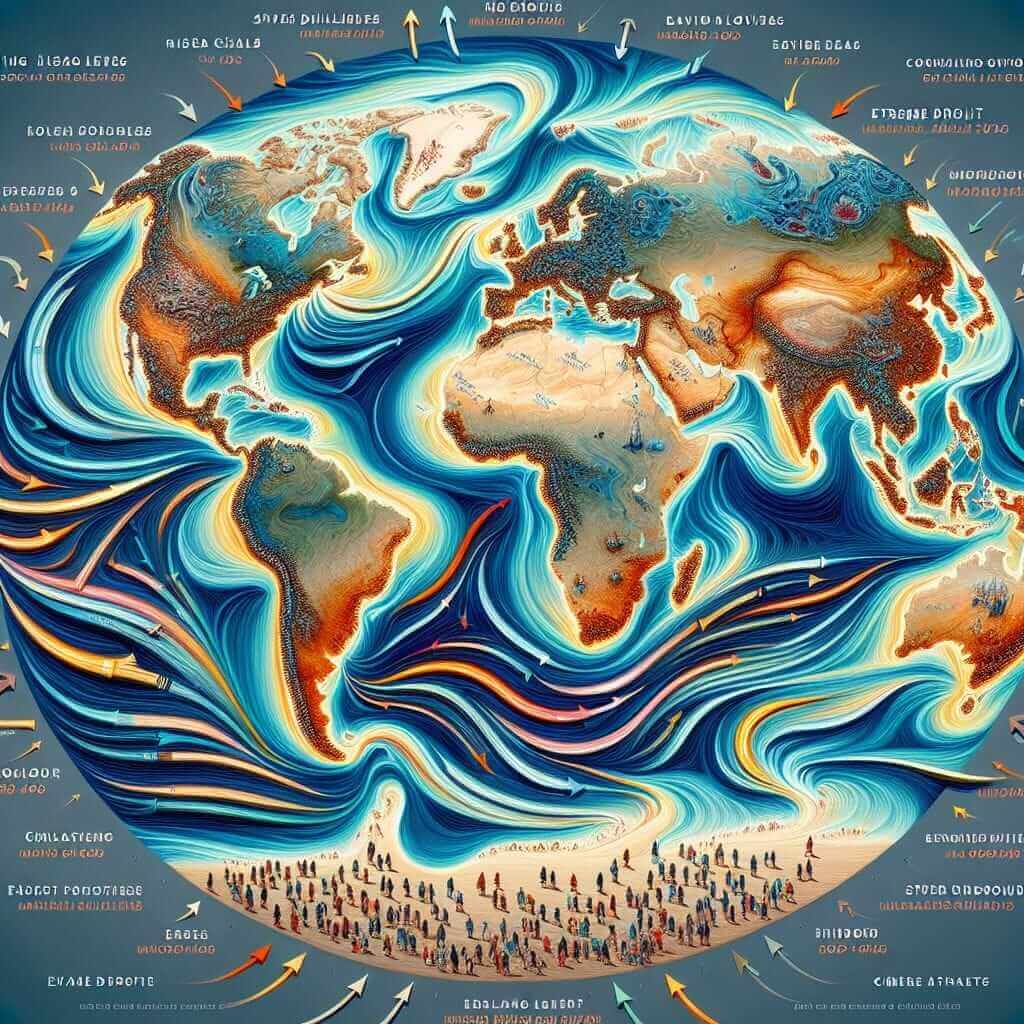The IELTS Reading test requires candidates to comprehend and analyze a range of texts. Topics often reflect current issues, making subjects like climate change both relevant and crucial to understand. The issue of how climate change affects migration patterns has appeared in various forms in past IELTS exams and is likely to surface again due to its increasing relevance.
In this article, we will examine the topic “How is climate change affecting migration patterns?” We will create a detailed IELTS reading practice test focusing on this subject. Let’s delve into this matter and learn how climate change affects human migration, a topic increasingly significant in today’s world.
Reading Practice Test on Climate Change and Migration Patterns
Passage: Climate Change and Human Migration
Easy Text
Climate change is a major force influencing human migration. Several factors contribute to the linkage between climatic shifts and population movement, including rising temperatures, extreme weather events, and sea-level rise. These environmental changes can make certain areas uninhabitable, forcing people to seek refuge elsewhere.
Agricultural regions are particularly vulnerable, as erratic weather patterns can ruin crops and deplete food resources. In the coastal cities, inundation from rising seas forces communities to relocate. Furthermore, extreme weather events such as hurricanes, floods, and droughts devastate infrastructure, prompting mass movements of people.
Moreover, climate change exacerbates existing social and economic tensions, often leading to conflicts over dwindling resources, which in turn drive migration. It is critical to address these issues through comprehensive planning and international cooperation to mitigate human suffering and manage migration patterns more effectively.

Questions
Multiple Choice
-
Which of the following is NOT mentioned as a direct impact of climate change influencing migration?
- A. Rising sea levels
- B. Depleting crop resources
- C. Technological advancements
- D. Hurricanes and floods
-
What is a significant effect of climate change on agriculture?
- A. Increased technological investments
- B. Creation of new crop types
- C. Crop damage and food shortages
- D. Extended growing seasons
True/False/Not Given
-
Climate change only affects migration in coastal areas.
- True
- False
- Not Given
-
International cooperation is suggested as a means to handle migration issues.
- True
- False
- Not Given
Answer Keys and Detailed Explanations
-
C. Technological advancements
- Explanation: Technological advancements are not discussed in the passage as a factor influencing migration. The other options (A, B, and D) are explicitly mentioned.
-
C. Crop damage and food shortages
- Explanation: The passage states that erratic weather patterns ruin crops and deplete food resources, directly impacting agricultural regions.
-
False
- Explanation: The passage mentions that climate change affects both agricultural regions and coastal areas, not restricted to coastal areas only.
-
True
- Explanation: The last paragraph suggests the need for international cooperation and comprehensive planning to address issues related to climate-induced migration.
Common Errors to Avoid
- Misinterpreting information: Be careful not to mix up details from the passage. Focus on what is explicitly stated.
- Generalization: Avoid assuming information that is not provided. Stick to what is presented in the text.
- Overlooking keywords: Pay attention to keywords and phrases that highlight critical points in the passage.
Vocabulary Highlights
- Inundation (noun): /ˌɪnʌnˈdeɪʃən/ – an overwhelming abundance of people or things; flooding.
- Erratic (adjective): /ɪˈrætɪk/ – not even or regular in pattern or movement; unpredictable.
- Exacerbate (verb): /ɪɡˈzæsərˌbeɪt/ – make (a problem, bad situation, or negative feeling) worse.
Grammar Insights
-
Relative Clauses:
- Definition: A clause that starts with a relative pronoun (who, which, that, etc.) and describes a noun.
- Example: “Agricultural regions are particularly vulnerable, as erratic weather patterns can ruin crops.”
-
Modals of Suggestion and Necessity:
- Usage: Used to suggest solutions or necessities.
- Example: “It is critical to address these issues through comprehensive planning and international cooperation.”
Tips for Scoring High in IELTS Reading
- Practice Regularly: Frequent practice helps familiarize with different types of questions and improve speed.
- Enhance Vocabulary: A broad vocabulary helps in understanding passages more effectively.
- Develop Skimming and Scanning Techniques: Quick reading strategies can save time and improve accuracy.
- Understand Question Types: Knowing various question formats helps in preparing better and avoiding common pitfalls.
Explore related articles on effects of climate change on global migration and how climate change influences global weather patterns for broader understanding and enhanced study practice.
By mastering these elements, you will be well-prepared for the Reading section of the IELTS, especially on topics as pertinent and frequent as climate change and its impact on migration.